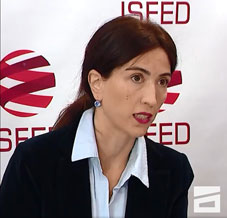
ISFED Flags Possible Manipulation in Georgia's Election Data
By Liza Mchedlidze
Friday, November 8, 2024
The International Society for Fair Elections and Democracy (ISFED) recently raised concerns over irregularities in voter turnout data reported by Georgia's Central Election Commission (CEC) from the October 26 election. Based on ISFED's analysis, several trends suggest possible data manipulation, especially when looking at voter activity by gender.
ISFED's findings include:
1. Unusual Gender Gaps in Turnout: In many precincts, the difference between male and female voter turnout is striking. For instance, in 62 precincts, turnout for registered male voters reached 80-100%, while female turnout averaged just 57%. Even more concerning, in some precincts, male turnout reportedly exceeded 100% of registered male voters.
2. Inconsistent Revised Data: ISFED noted significant changes between the CEC's initial and revised reports on turnout by gender. Initially, the CEC reported that 961,751 women and 1,098,661 men had voted. However, in later data, the female voter count increased by about 91,000, while the male voter count dropped by nearly 89,000.
3. Changes in Specific District Totals: ISFED highlighted a noticeable data shift in Marneuli's District No. 22, where the initial turnout count was 41,766. This figure was later revised to 43,858 voters. After ISFED requested detailed data from individual precincts, the CEC updated its website, removing access to the initial voter activity numbers.
4. Mismatches in Voter Totals: ISFED found that in some precincts, the total voter counts didn't match the figures reported in the CEC's summary documents, adding to concerns about data reliability.
ISFED has also requested further information on special voter lists, which include groups such as military personnel and hospital patients, and plans to analyze this data for similar irregularities. The watchdog is concerned that these discrepancies could indicate intentional manipulation of voting results, undermining the election's integrity.
In response to these findings, the CEC called ISFED's claims "manipulative" and "misinformation." The Commission acknowledged that minor discrepancies might exist in a few precincts but stressed that such errors affect only a small number of voters. The CEC argued that the generalization of these irregularities was either due to a lack of understanding of the electoral process or deliberate attempts to undermine the election.
"The generalization of these cases can only be explained by the fact that we are dealing with a lack of electoral knowledge or a deliberate action to damage the electoral process," the CEC stated.

